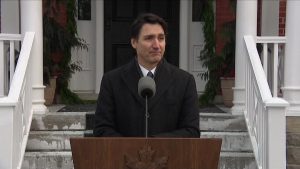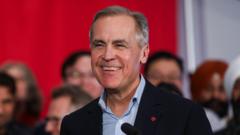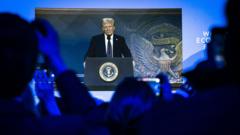As Canada’s political landscape shifts, Prime Minister Justin Trudeau confirmed on Monday that he will step down from his leadership role in the Liberal Party, a decision born from escalating divisions within the party and diminishing support from its members. This pivotal moment invites Canadians to reassess their nation's political trajectory after nearly ten years of controversial leadership and policies.
Trudeau Steps Down: A Defining Shift in Canadian Politics

Trudeau Steps Down: A Defining Shift in Canadian Politics
Prime Minister Justin Trudeau announces his resignation, igniting a race for a new Liberal leader amid growing internal turmoil.
In a press conference outside Rideau Cottage, Trudeau articulated the reasons behind his decision, stating, “This country deserves a real choice in the next election, and it’s become clear to me that if I’m having to fight internal battles, I cannot be the best option in that election.” His words reveal the internal struggles that have affected the party’s cohesion, particularly in light of lingering questions about the effectiveness of his leadership as the federal election approaches.
Trudeau’s resignation follows extended scrutiny fueled by declining public approval and frustration over his administration's approach to critical issues such as inflation, energy policies, and national unity. Critics have frequently challenged Trudeau's focus on international initiatives at the expense of domestic priorities, leading to a sentiment among many Canadians that their needs have been overlooked.
The announcement, delivered after a reflective family dinner during the holiday season, signals a turning point for the beleaguered leader. While he has drawn international acclaim for his progressive stances on climate change and social justice, these positions have also elicited significant backlash domestically, especially from resource-rich provinces like Alberta, where economic concerns are paramount.
For rival Conservative Party members, Trudeau’s exit signifies a potential breakthrough to address what they label years of economic mismanagement and divisive leadership. With his term marked by ethical issues, escalating deficits, and a contentious governing style, his departure could open the door for more centrist and cohesive governance.
The Liberal Party now faces its own set of challenges as it embarks on the process of selecting a successor who can mend party fractures while appealing to an electorate weary of longstanding progressive strategies. Meanwhile, opposition factions are expected to seize this transition as an opportunity to project a stark alternative to the decade-long dominance of the Liberal Party.
Trudeau's resignation marks the closure of a tumultuous era in Canadian politics, one characterized by grand ambitions and persistent obstacles. As the Liberal Party initiates its leader search, the nation embarks on a critical juncture where the electorate might pursue a departure from the progressive policies prevalent over the past ten years.
Trudeau’s resignation follows extended scrutiny fueled by declining public approval and frustration over his administration's approach to critical issues such as inflation, energy policies, and national unity. Critics have frequently challenged Trudeau's focus on international initiatives at the expense of domestic priorities, leading to a sentiment among many Canadians that their needs have been overlooked.
The announcement, delivered after a reflective family dinner during the holiday season, signals a turning point for the beleaguered leader. While he has drawn international acclaim for his progressive stances on climate change and social justice, these positions have also elicited significant backlash domestically, especially from resource-rich provinces like Alberta, where economic concerns are paramount.
For rival Conservative Party members, Trudeau’s exit signifies a potential breakthrough to address what they label years of economic mismanagement and divisive leadership. With his term marked by ethical issues, escalating deficits, and a contentious governing style, his departure could open the door for more centrist and cohesive governance.
The Liberal Party now faces its own set of challenges as it embarks on the process of selecting a successor who can mend party fractures while appealing to an electorate weary of longstanding progressive strategies. Meanwhile, opposition factions are expected to seize this transition as an opportunity to project a stark alternative to the decade-long dominance of the Liberal Party.
Trudeau's resignation marks the closure of a tumultuous era in Canadian politics, one characterized by grand ambitions and persistent obstacles. As the Liberal Party initiates its leader search, the nation embarks on a critical juncture where the electorate might pursue a departure from the progressive policies prevalent over the past ten years.























